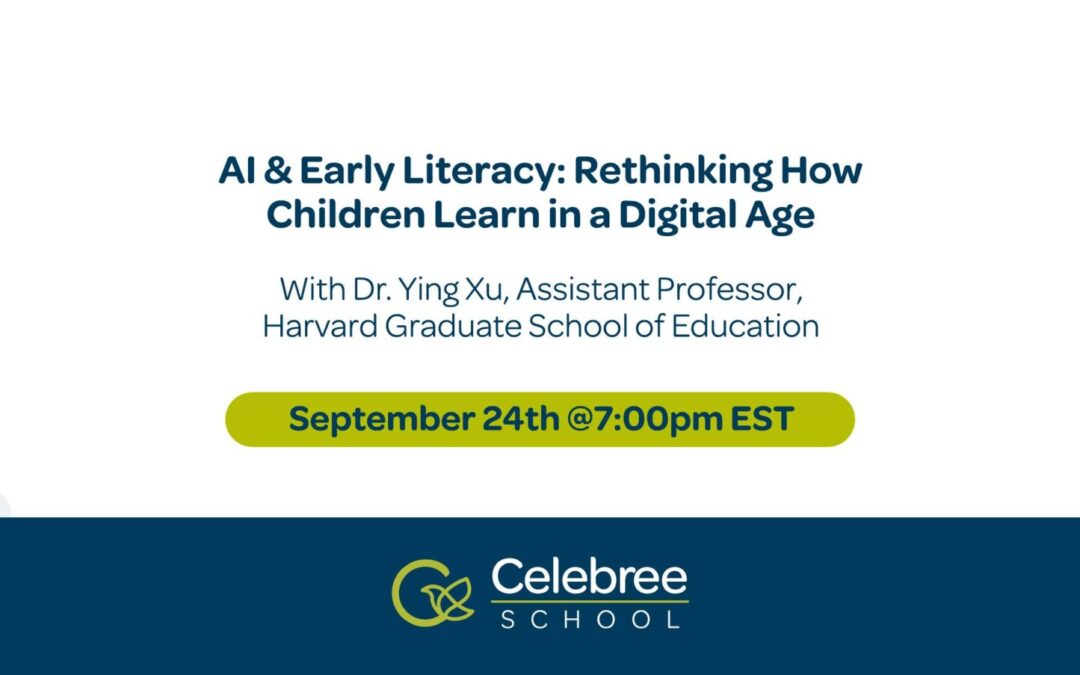In today’s classrooms and living rooms, artificial intelligence is no longer a futuristic concept, it’s part of our children’s daily lives. From voice assistants answering curious questions to adaptive learning tools guiding reading practice, AI is quietly shaping the way kids learn, think, and interact. But what does this mean for early literacy, critical thinking, and child development?
On September 24th from 7-8 PM EDT, Celebree School invites you to join a live, thought-provoking conversation with Dr. Ying Xu, Assistant Professor at the Harvard Graduate School of Education, whose groundbreaking research examines how AI tools influence children’s cognitive, social, and emotional growth.
Why Dr. Xu’s Work Matters
Dr. Xu’s studies, featured in collaborations with PBS KIDS and funded by the National Science Foundation, explore how children interact with AI differently than they do with humans, why they may struggle to detect misinformation, and how their trust in digital tools develops over time.
“Children can actually learn effectively from AI, as long as the AI is designed with learning principles in mind.” — Dr. Ying Xu
Her work reveals both the promise and the pitfalls of AI in education:
- AI as a learning partner: In certain contexts, AI can spark curiosity and support STEM learning by asking immersive, playful questions.
- The human connection gap: “When children talk to a human, they’re more likely to steer the conversation, ask follow-up questions, and share their own thoughts… AI still falls short.”
- The challenge of truth: Young learners can be highly trusting of AI, sometimes unable to discern fact from fiction, highlighting the need for AI literacy from an early age.
- Understanding the “mind” of AI: Many children describe AI in human-like terms yet hold incomplete or magical ideas about how it works, influencing how they respond to it.
The Opportunities AI Brings
- Personalized learning paths tailored to each child’s pace
- Instant feedback to reinforce learning in real-time
- Expanded access to diverse stories and perspectives
- Used well, AI can enhance engagement and supplement the role of parents and teachers.
The Risks and Challenges
- Over-reliance on screen-based learning can reduce hands-on experiences
- Risk of exposure to misinformation or biased content
- Potential for reduced human interaction, essential for language and social-emotional growth
From Research to Everyday Parenting
In her April appearance on the Screen Deep podcast, Dr. Xu went beyond the lab to share practical guidance for parents and educators:
- Why “co-learning” with your children is essential as AI tools evolve.
- How to assess whether an AI tool is age-appropriate.
- Why AI can never replace—but can complement—human interactions.
- The importance of including children in AI design processes to ensure developmental and ethical alignment.
As she explains in the podcast: “AI can support children’s learning — and it still can’t replace human interaction.”
Join the Conversation
This webinar will unpack what these findings mean for parents, educators, and communities striving to prepare children for an AI-powered world. You’ll leave with practical takeaways like strategies for fostering healthy skepticism, encouraging rich conversations, and guiding children toward safe, meaningful engagement with AI tools.
Whether you’re raising a future reader, teaching a curious class, or working in education technology, you won’t want to miss Dr. Xu’s insights into the future of early literacy in a digital age.
Reserve your spot now and learn more about the impact of AI: Register Now
Tune into Dr. Xu’s April Screen Deep podcast episode: Listen Here

